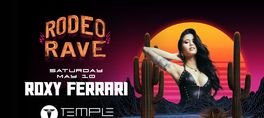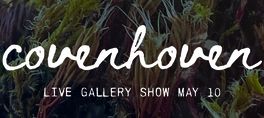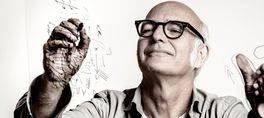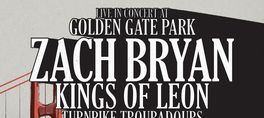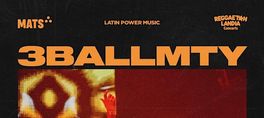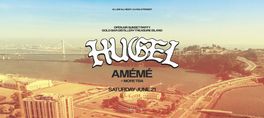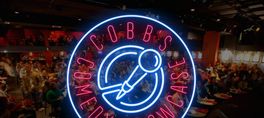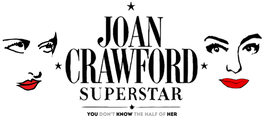JEREMY ENIGK
Three good reasons why it’s hard to remember a time when an album like Jeremy Enigk’s Return of the Frog Queen sounded shocking:
1) At the time of its release in 1996, there was no other album like it.
2) In the 22 years between then and now, its marriage of seemingly opposing sensibilities—English folk and American punk; orchestral chamber pop and progressive rock; surreal, pastoral, fanciful lyrics that burn to express personal, emotional, and spiritual quandary—has become the blueprint for so much great music that a young listener can be forgiven for thinking that things were always just like that.
This isn’t to claim some kind of Velvet Underground/Big Star status for the album, but it is to say that you can draw a straight line between Frog Queen and elements of Elliott Smith, Belle & Sebastian, Rufus Wainwright, Destroyer, the Decemberists, Fleet Foxes, Sufjan Stevens, Beirut, Grizzly Bear, Joanna Newsom, Bon Iver, and many, many other artists who have come to define the past two decades of indie music.
3) It’s getting harder to remember anything anymore.
But Return of the Frog Queen is worth remembering. Or discovering. And most definitely celebrating. Though you rarely see it turn up on lists of 50 Best Things of Whatever Year We Wish We Still Lived in Because the Present Is Such a Consummate Drag, the album was an indisputable innovation in the world of ‘90s indie rock, rewriting a litany of unwritten rules about sound, subject matter, and solo identity for lead singers of successful bands.
As you probably know, Enigk was the singer/guitarist of Sunny Day Real Estate, the Seattle quartet widely credited as the Big Bang of the post-hardcore, indie rock variant of emo that would spend the next decade morphing into a massively commercial enterprise.
The story of the band’s splintering during the making of their follow-up album (LP2)—and triumphant reunion a few years later—has been well-told elsewhere. But for our purposes, it’s worth bearing in mind that the break-up drama formed the background from which Return of the Frog Queen emerged.
By the time the band broke up, he had been loved, respected, celebrated, criticized, vilified, and reproached. He was 21 years old.
The songs that formed the basis of Enigk’s first solo album were about as far from the sound of Sunny Day Real Estate as you could imagine—unless all you’d heard of them was “Pheurton Skeurto,” the little piano songlet that sounds (delightfully) out of place on Diary.
Spare acoustic guitar figures and solemn, almost plainsong melodies are the foundational elements, which Enigk and his two key collaborators, producer Greg Williamson and arranger/conductor Mark Nichols, build up into astonishingly dynamic worlds of sound. But for all the swoops and bends, the unconventional entrances and exits, the arrangements remain organic, and perfectly united behind the singular human voice at the center of it all.
Even after two decades, it’s difficult to find a name for the atmosphere conjured by the album. There are traces of Incredible String Band pastoralia, but also a strain of Pink Floydish unease. Bowie between Man Who Sold the World and Hunky Dory. It’s not dark exactly, but only because your eyes have adjusted to candlelight. It feels mystical, even metaphysical.
JEREMY ENIGK
Three good reasons why it’s hard to remember a time when an album like Jeremy Enigk’s Return of the Frog Queen sounded shocking:
1) At the time of its release in 1996, there was no other album like it.
2) In the 22 years between then and now, its marriage of seemingly opposing sensibilities—English folk and American punk; orchestral chamber pop and progressive rock; surreal, pastoral, fanciful lyrics that burn to express personal, emotional, and spiritual quandary—has become the blueprint for so much great music that a young listener can be forgiven for thinking that things were always just like that.
This isn’t to claim some kind of Velvet Underground/Big Star status for the album, but it is to say that you can draw a straight line between Frog Queen and elements of Elliott Smith, Belle & Sebastian, Rufus Wainwright, Destroyer, the Decemberists, Fleet Foxes, Sufjan Stevens, Beirut, Grizzly Bear, Joanna Newsom, Bon Iver, and many, many other artists who have come to define the past two decades of indie music.
3) It’s getting harder to remember anything anymore.
But Return of the Frog Queen is worth remembering. Or discovering. And most definitely celebrating. Though you rarely see it turn up on lists of 50 Best Things of Whatever Year We Wish We Still Lived in Because the Present Is Such a Consummate Drag, the album was an indisputable innovation in the world of ‘90s indie rock, rewriting a litany of unwritten rules about sound, subject matter, and solo identity for lead singers of successful bands.
As you probably know, Enigk was the singer/guitarist of Sunny Day Real Estate, the Seattle quartet widely credited as the Big Bang of the post-hardcore, indie rock variant of emo that would spend the next decade morphing into a massively commercial enterprise.
The story of the band’s splintering during the making of their follow-up album (LP2)—and triumphant reunion a few years later—has been well-told elsewhere. But for our purposes, it’s worth bearing in mind that the break-up drama formed the background from which Return of the Frog Queen emerged.
By the time the band broke up, he had been loved, respected, celebrated, criticized, vilified, and reproached. He was 21 years old.
The songs that formed the basis of Enigk’s first solo album were about as far from the sound of Sunny Day Real Estate as you could imagine—unless all you’d heard of them was “Pheurton Skeurto,” the little piano songlet that sounds (delightfully) out of place on Diary.
Spare acoustic guitar figures and solemn, almost plainsong melodies are the foundational elements, which Enigk and his two key collaborators, producer Greg Williamson and arranger/conductor Mark Nichols, build up into astonishingly dynamic worlds of sound. But for all the swoops and bends, the unconventional entrances and exits, the arrangements remain organic, and perfectly united behind the singular human voice at the center of it all.
Even after two decades, it’s difficult to find a name for the atmosphere conjured by the album. There are traces of Incredible String Band pastoralia, but also a strain of Pink Floydish unease. Bowie between Man Who Sold the World and Hunky Dory. It’s not dark exactly, but only because your eyes have adjusted to candlelight. It feels mystical, even metaphysical.
show less

